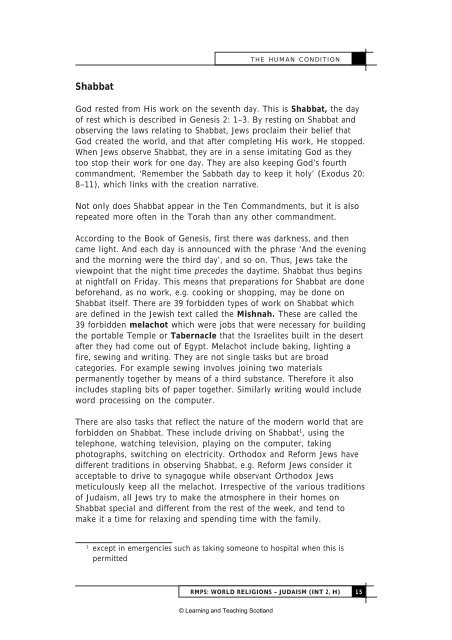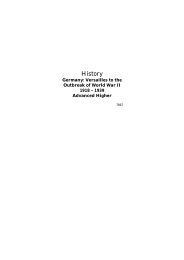RMPS - Int2/Higher - World Religions - Judaism - Education Scotland
RMPS - Int2/Higher - World Religions - Judaism - Education Scotland
RMPS - Int2/Higher - World Religions - Judaism - Education Scotland
You also want an ePaper? Increase the reach of your titles
YUMPU automatically turns print PDFs into web optimized ePapers that Google loves.
Shabbat<br />
THE HUMAN CONDITION<br />
God rested from His work on the seventh day. This is Shabbat, the day<br />
of rest which is described in Genesis 2: 1–3. By resting on Shabbat and<br />
observing the laws relating to Shabbat, Jews proclaim their belief that<br />
God created the world, and that after completing His work, He stopped.<br />
When Jews observe Shabbat, they are in a sense imitating God as they<br />
too stop their work for one day. They are also keeping God’s fourth<br />
commandment, ‘Remember the Sabbath day to keep it holy’ (Exodus 20:<br />
8–11), which links with the creation narrative.<br />
Not only does Shabbat appear in the Ten Commandments, but it is also<br />
repeated more often in the Torah than any other commandment.<br />
According to the Book of Genesis, first there was darkness, and then<br />
came light. And each day is announced with the phrase ‘And the evening<br />
and the morning were the third day’, and so on. Thus, Jews take the<br />
viewpoint that the night time precedes the daytime. Shabbat thus begins<br />
at nightfall on Friday. This means that preparations for Shabbat are done<br />
beforehand, as no work, e.g. cooking or shopping, may be done on<br />
Shabbat itself. There are 39 forbidden types of work on Shabbat which<br />
are defined in the Jewish text called the Mishnah. These are called the<br />
39 forbidden melachot which were jobs that were necessary for building<br />
the portable Temple or Tabernacle that the Israelites built in the desert<br />
after they had come out of Egypt. Melachot include baking, lighting a<br />
fire, sewing and writing. They are not single tasks but are broad<br />
categories. For example sewing involves joining two materials<br />
permanently together by means of a third substance. Therefore it also<br />
includes stapling bits of paper together. Similarly writing would include<br />
word processing on the computer.<br />
There are also tasks that reflect the nature of the modern world that are<br />
forbidden on Shabbat. These include driving on Shabbat 1 , using the<br />
telephone, watching television, playing on the computer, taking<br />
photographs, switching on electricity. Orthodox and Reform Jews have<br />
different traditions in observing Shabbat, e.g. Reform Jews consider it<br />
acceptable to drive to synagogue while observant Orthodox Jews<br />
meticulously keep all the melachot. Irrespective of the various traditions<br />
of <strong>Judaism</strong>, all Jews try to make the atmosphere in their homes on<br />
Shabbat special and different from the rest of the week, and tend to<br />
make it a time for relaxing and spending time with the family.<br />
1 except in emergencies such as taking someone to hospital when this is<br />
permitted<br />
<strong>RMPS</strong>: WORLD RELIGIONS – JUDAISM (INT 2, H) 15<br />
© Learning and Teaching <strong>Scotland</strong>
















